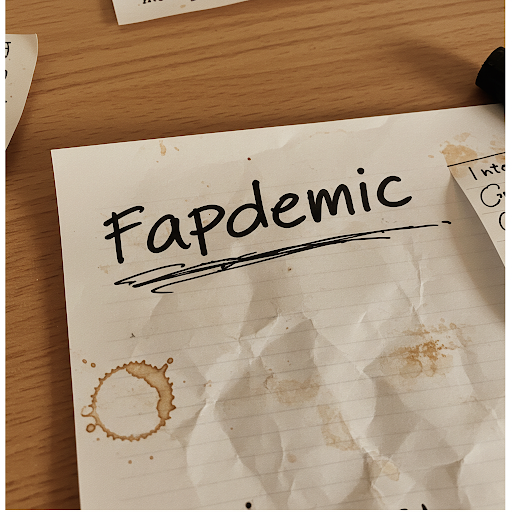In the age of hyperconnectivity and instant gratification, digital habits have rapidly transformed how we live, interact, and even indulge in private moments.
While it may seem like a joke on the surface, the Fapdemic represents a deeper, more complex issue affecting millions globally. This digital addiction is not just about pleasure—it’s about loneliness, mental health, altered brain chemistry, and the hidden consequences of our virtual lifestyles.
The Rise of the Fapdemic
The explosion of high-speed internet, smartphones, and free adult websites has created an environment where explicit content is more accessible than ever. Just a few taps on a screen open the floodgates to a seemingly endless stream of dopamine-triggering videos and images.
During the COVID-19 pandemic, these platforms saw a massive spike in traffic. Lockdowns, isolation, boredom, and emotional stress led many to seek escape through adult entertainment. But what started as a coping mechanism for some gradually became a compulsive habit for many.
The term “Fapdemic” emerged from online forums and social media, where users began discussing their growing dependency on adult content and how it was affecting their productivity, relationships, and mental well-being.
Understanding the Addiction
Pornography addiction isn’t officially classified as a mental disorder in many medical manuals, but its effects mirror other types of behavioral addictions. The brain’s reward system, especially the release of dopamine, plays a crucial role.
Each viewing session delivers a rush of pleasure chemicals, but over time, the brain starts needing more stimulation to achieve the same high. This can lead to:
-
Desensitization – Needing increasingly extreme content to feel aroused.
-
Escalation – Spending more time browsing or searching for new material.
-
Compulsion – Being unable to stop despite knowing it’s affecting one’s life.
It’s a silent cycle that traps many in their own screens, feeding an addiction that is easy to hide but difficult to escape.
The Hidden Costs
The Fapdemic doesn’t just impact individuals—it affects relationships, work-life balance, and even society at large. Some of the most common consequences include:
1. Reduced Productivity
Excessive browsing can eat up hours meant for work, study, or social interaction. People report procrastinating or losing focus due to their compulsive habits.
2. Intimacy Issues
Frequent consumption of porn can distort real-life expectations of sex and intimacy. It may lead to decreased interest in partners, performance anxiety, or emotional detachment in relationships.
3. Social Withdrawal
As habits deepen, some users begin preferring virtual pleasure over social interaction. This fuels isolation, further encouraging the addictive cycle.
4. Mental Health Decline
Guilt, shame, depression, and anxiety often accompany compulsive behavior. Many users experience low self-esteem and a sense of loss of control.
Why It’s Spreading Like a Pandemic
The reasons behind the Fapdemic’s rapid spread are rooted in modern life:
Accessibility
Unlike drug or alcohol addiction, adult content is free, legal, and instantly available. There are no financial or legal barriers to entry, making it easy to consume—and just as easy to overconsume.
Anonymity
People can indulge in this behavior privately, without judgment. The cloak of anonymity often prevents users from seeking help or discussing their struggles.
Isolation
Modern life, especially post-pandemic, has become lonelier. Social media may connect us digitally, but it often leaves emotional gaps. Many turn to adult content to fill this void.
The NoFap Movement and Digital Detoxing
As awareness grows, so does resistance. Online communities such as “NoFap” have formed to help people break free from the addiction. These groups promote abstinence or moderation from pornography and masturbation, encouraging members to “rewire” their brains.
Many users report significant improvements in energy levels, confidence, mental clarity, and motivation after following such regimens. However, success varies, and long-term change requires patience and commitment.
Seeking a Healthy Balance
It’s important to clarify that masturbation and even occasional consumption of adult content is not inherently harmful. In fact, in moderation, it can be a healthy part of human sexuality. The problem arises when it becomes compulsive and starts interfering with daily life.
Here are a few strategies to regain balance:
1. Track Your Habits
Awareness is the first step. Use apps or journals to note your screen time and triggers.
2. Set Boundaries
Avoid using devices late at night or when bored. Replace browsing time with hobbies, exercise, or reading.
3. Use Website Blockers
Install extensions or apps that limit access to adult websites during certain hours.
4. Talk About It
Whether with a friend, therapist, or support group, discussing your experience reduces shame and opens doors to recovery.
Breaking the Stigma
The biggest challenge in addressing the Fapdemic is the stigma around it. Because it involves private behavior, people feel embarrassed to admit they’re struggling. Yet, like any other addiction, it thrives in silence and secrecy.
It’s time to treat this issue with the same seriousness as any other mental health challenge. Compassion, education, and honest conversation are crucial.
Conclusion
The Fapdemic isn’t just a meme or an internet trend—it’s a real, growing concern in today’s digital world. With rising cases of digital dependency, it’s more important than ever to recognize when pleasure turns into a prison.
Reclaiming control over our habits doesn’t mean rejecting technology or pleasure. It means finding balance, understanding our needs, and prioritizing human connection in a world that often substitutes it with a screen.

